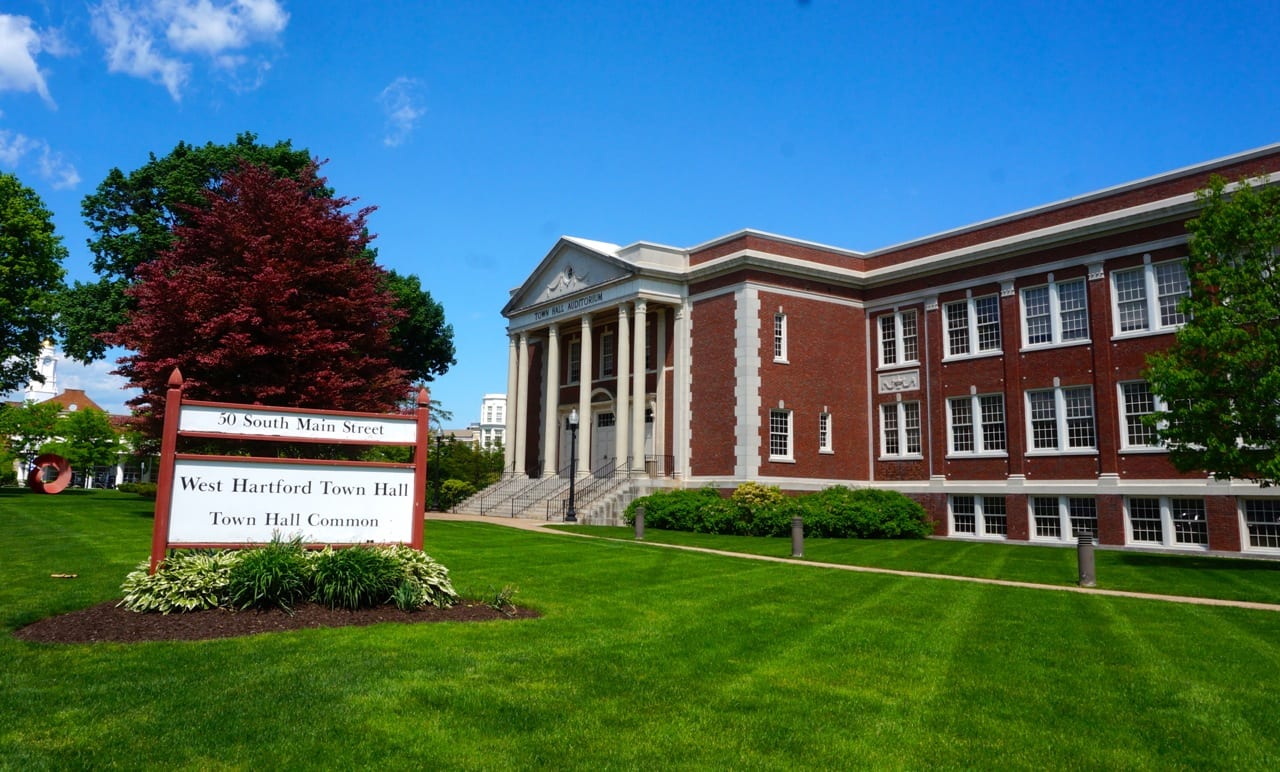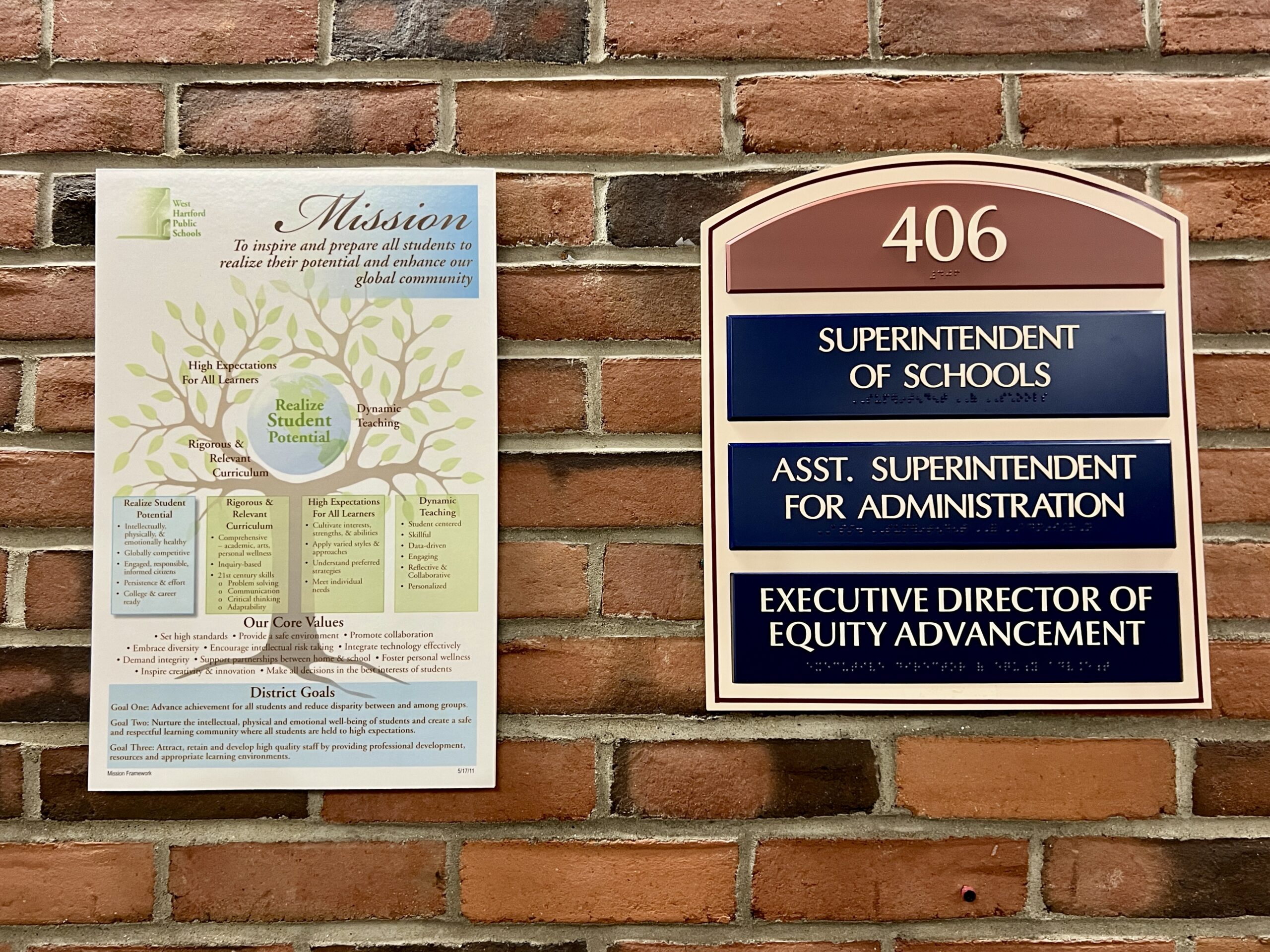West Hartford Republicans Propose ‘Anti-Toll’ Resolution, but Council Passes Amended Version Addressing Transportation Infrastructure

Audio By Carbonatix

West Hartford Town Hall. Photo credit: Ronni Newton
Republicans on the West Hartford Town Council wanted to take a public stand against tolls, but after a heated discussion, Democrats voted in favor of a resolution with completely different wording.
By Dexter McCann
You couldn’t find the subject on the agenda, but the May 14 West Hartford Town Council meeting was defined by a lively debate over the increasingly controversial subject of statewide tolls, the condition of the state’s infrastructure, town government’s involvement in the issue, and the need to conduct Council business in a public forum.
Under suspense, because it had not been submitted in time to be included on the agenda, Republican Mary Fay introduced a resolution which would have officially declared the Council’s opposition to tolls, and before any vote took place, Democrat Dallas Dodge proposed a “strike all” amendment which substituted a resolution “encouraging state investment in transportation infrastructure.”
The Council voted 5-2, along party lines (one member from each party was absent), in favor of modifying Fay’s submitted resolution with Dodge’s “strike all” amendment, and then passed Dodge’s resolution urging the Connecticut’s General Assembly to prioritize the “strengthening of the Special Transportation Fund” while “achieving fiscal sustainability and minimizing the financial burden on state residents.” That vote, taken by roll call, was also 5-2 and split on party lines.
Republican Chris Williams’ requested that a third point be added to Dodge’s wording – ”without implementing tolls” – but it did not garner support of enough Council members and the resolution did not in fact mention tolls at all. Williams said he might have supported the resolution if that wording had been added.
Fay’s initial proposal, which was in direct opposition to the implementation of tolls, detailed several potential detriments to the quality of life of West Hartford residents should the statewide toll proposal be realized. In the proposed resolution, Fay argued that highway tolls would result in an increase of commercial vehicles, such as trucks and trailers, on West Hartford’s roads as they attempt to bypass tolls on the highways. As a result, in the opinion of Fay, West Hartford’s roads would be subject to heightened traffic, leading to more accidents as well as an increasing rate of disrepair on local roads. Such disrepair would be a disadvantage for local businesses and further the tax burden on West Hartford’s middle class residents.
Fay attributed the inadequate state of transportation infrastructure to mismanagement of appropriated funds. She argued that the state gas tax, which brings in $300 million in revenue each year, should be more than enough to fund Connecticut’s investment into repairing its crumbling infrastructure, but instead that money has been “squandered,” Fay said.
Tolls are another tax on the middle class, said Fay. “It’s a very, very serious issue. We’re trying to be responsive to our constituents.” Other towns in the state have passed anti-toll resolutions, she said.
“West Hartford is a very powerful town politically,” Republican Chris Williams said. “A resolution from us that we do not support tolls would go a long way.”
Dodge’s amendment completely replaced the wording in the initial proposal, resulting in a resolution urging Gov. Ned Lamont and the State General Assembly to “work towards strengthening the special transportation fund” and to “develop a plan to ensure adequate investment in our [Connecticut’s] transportation infrastructure while achieving fiscal sustainability and minimizing the financial burden on state residents.”
Dodge had several qualms with Fay’s initial anti-toll proposal, including that it ignored the issue, which members of both parties acknowledge on a statewide level, that the state needs to fix its infrastructure..
“Any solution must minimize impact on Connecticut residents,” Dodge said. He said it’s a complex question with no easy answers. He urged the Council to let the state government make its own decision on the issue of tolls, and believed his proposal is bipartisan and speaks to the general consensus that the current state of infrastructure in Connecticut is unacceptable.
Dodge also noted that he was concerned that the original resolution was brought up as a suspense item, and only Council members had seen it. An emailed request by Fay for comments from Council members was quickly squelched by Corporation Counsel Pat Alair, who responded with a reminder that all policy debate needs to be conducted in a public forum.
“I don’t appreciate this amendment,” Williams said, apparently blindsided by Dodge’s amendment, which he had not seen until it was unveiled Tuesday night. In response, Dodge stated that he had been unwilling to submit his proposal over email, given that policy debate in a private forum would come into direct conflict with the Freedom of Information Act.
Williams argued that West Hartford needs to take a strong stance on the issue of tolls, given the town’s powerful sway in state politics as well as the potential financial detriment of tolls to West Hartford residents. Williams said that the majority party would have to eventually ask itself “How much is enough?” in terms of the local tax burden, and cited consistent increases in state income tax since 1991 as evidence that toll rates would likely increase over time should they be implemented on Connecticut’s highways.
Democratic councilor Ben Wenograd said that Fay’s resolution was a “borderline political move to jump on an issue that the state is considering that is controversial.” Wenograd added, “This is why we elected our governor and legislators,” and urged his fellow Council members not to interfere in what he perceived to be a statewide issue, but suggested that a Council committee should consider the potential impact of increased traffic on our streets if tolls are approved, as well as when work on the I-84 viaduct takes place..
Mayor Shari Cantor said she “did not know” her stance regarding tolls as of now, but would like to hear more from economic experts on the potential local and regional impacts tolls would have. She and Town Manager Matt Hart had heard a very informative report on transportation infrastructure from the state Department of Transportation at a recent meeting of the Connecticut Conference of Municipalities (CCM), Cantor said, and will request a copy that can be shared with the rest of the Council.
Cantor said she does not support the state’s current infrastructure in its current condition, which impacts the economy and environment, as well as causes millions of hours of wasted time. She agreed with Dodge’s resolution strengthening the Special Transportation Fund, and ensuring adequate investment in transportation..
Following the meeting, Fay, who proposed the anti-toll resolution, told We-Ha.com that she was “surprised and dissapointed” by Dodge’s “strike-all amendment” which “was really taking our resolution off the table” and failed to even mention tolls, which Fay said 90 percent of residents oppose. “We wanted to make sure we were on the record for not supporting more taxes on residents.”
Fay said that she had given the Town Council copies of her proposal last week, but had not seen Dodge’s amendment until it was unveiled during Tuesday night’s meeting. Fay said she had held hope that her resolution could have been passed, in non-partisan fashion, before the end of the legislative session in June, given the potential financial burden on West Hartford residents, but “that’s not how it happened.”
“The amended version of the resolution recognizes the bipartisan consensus that the current condition of Connecticut’s infrastructure is completely unacceptable and the state needs to reinvest in transportation,” Dodge told We-Ha.com after the meeting. “There are a number of competing ideas on how to raise the needed revenue, but that politically divisive debate belongs at the Capitol, not the Council table.”
A “No Tolls” group is planning a rally at the Capitol on Saturday, Fay said.
The statewide vote on toll legislation has yet to be scheduled, but the General Assembly will have in hand a resolution from the West Hartford Town Council encouraging state investment in transportation infrastructure.
Like what you see here? Click here to subscribe to We-Ha’s newsletter so you’ll always be in the know about what’s happening in West Hartford!




Failure to pass Fay’s resolution is proof that tax and spend liberalism is alive and well in West Hartford. If the 5 Dems at the meeting want a reference for a psych consult – they can contact me. Also there is a meeting for Overspenders Anonymous on Thursdays at 730. That may he a good outlet for the Dem members
Why should the citizens of Connecticut blindly accept the notion that our government won’t misappropriate funds derived from tolls? History has shown that no matter what “said controls” are in place they somehow get put aside when a favorite alternative use project comes along. Essentially, the representatives can’t be entrusted with more money. They need to understand they must work within the means of current revenue and debt service expectations, and to look critically at the efficacy of competing uses of money when running the business of the state. This means they may just have to “trim” failed programs from funding.
I would urge wide publication of representative’s names who vote for additional taxes (including tolls) be published during all election campaigns, and without regard for party affiliation. At least the voters would have a chance to eliminate those from office who operate in wanton disregard for fiscal responsibility.
How could the mayor state that she “did not know” her position on tolls ? It sounds like she would like another $10m study ? That would be another waste of taxpayer funds. Her vote says it all. She doesn’t need any more information, her vote on the Dodge-ball amendment speaks volumes… by not rejecting tolls it says that she and the rest of the D’s on the council support expanding the size of government with more taxes in order to support more out of control spending. WE DON’T HAVE A REVENUE PROBLEM. WE HAVE A SPENDING PROBLEM.